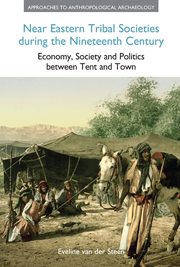 Near Eastern Tribal Societies during the Nineteenth Century
Near Eastern Tribal Societies during the Nineteenth Century Book contents
- Frontmatter
- Dedication
- Contents
- Acknowledgements
- Introduction
- 1 What is a tribe?
- 2 Travellers in the Levant during the nineteenth century
- 3 The dynamics of territorial and power structures
- 4 Oral traditions
- 5 Tribal society and its relation to the landscape
- 6 Tribal institutions
- 7 Relations between the tribes and the state
- 8 From tribe to tribal state: three case studies
- 9 The economy of tribal societies
- 10 Ethnicity and the sense of belonging
- 11 Women in tribal societies
- 12 Religion and folklore
- 13 Back in time: historical parallels
- Notes
- References
- Index
12 - Religion and folklore
- Frontmatter
- Dedication
- Contents
- Acknowledgements
- Introduction
- 1 What is a tribe?
- 2 Travellers in the Levant during the nineteenth century
- 3 The dynamics of territorial and power structures
- 4 Oral traditions
- 5 Tribal society and its relation to the landscape
- 6 Tribal institutions
- 7 Relations between the tribes and the state
- 8 From tribe to tribal state: three case studies
- 9 The economy of tribal societies
- 10 Ethnicity and the sense of belonging
- 11 Women in tribal societies
- 12 Religion and folklore
- 13 Back in time: historical parallels
- Notes
- References
- Index
Summary
The belief in God has often been advanced as not only the greatest, but the most complete of all the distinctions between man and the lower animals. It is however impossible, as we have seen, to maintain that this belief is innate or instinctive in man. On the other hand a belief in all-pervading spiritual agencies seems to be universal; and apparently follows from a considerable advance in man's reason, and from a still greater advance in his faculties of imagination, curiosity and wonder.
(Charles Darwin, The Descent of Man, 1871)Introduction
Religion seems to have played a more important role in the observations of the various nineteenth-century travellers than it did in most of the tribal societies they encountered. The main observation was that Bedouin were, on the whole, not very religious and that they had only a vague concept of what their religion entailed. The dividing line between religion and folklore was blurred in most societies. Folklore, ancient rituals and the concept of sacred space blended in with the daily life of every tribe and played an important role in their daily actions. Because of this, efforts by Wahabi theologians to root out these ancient customs together with modern vices were largely unsuccessful.
- Type
- Chapter
- Information
- Near Eastern Tribal Societies during the Nineteenth CenturyEconomy, Society and Politics between Tent and Town, pp. 235 - 253Publisher: Acumen PublishingPrint publication year: 2013


